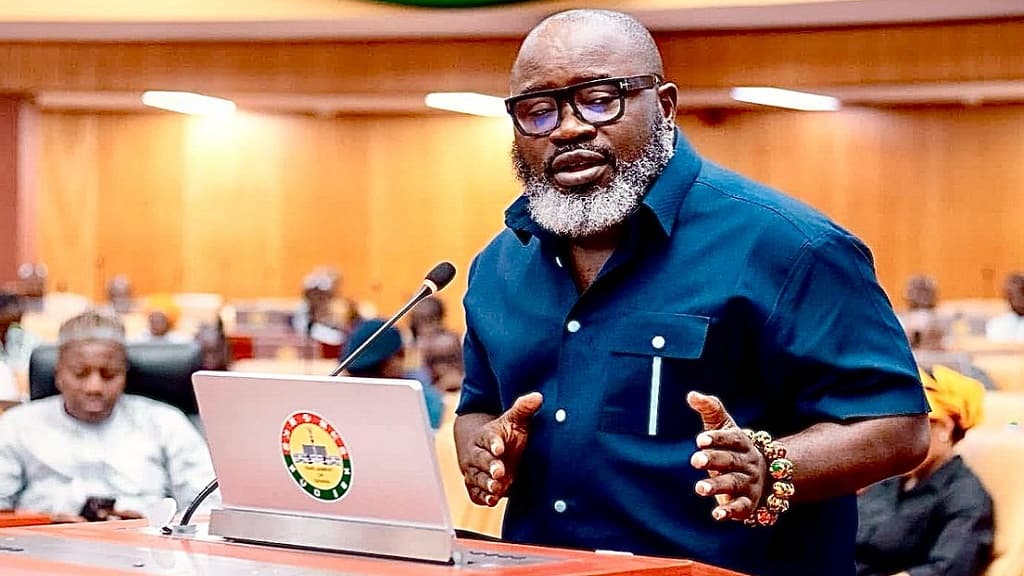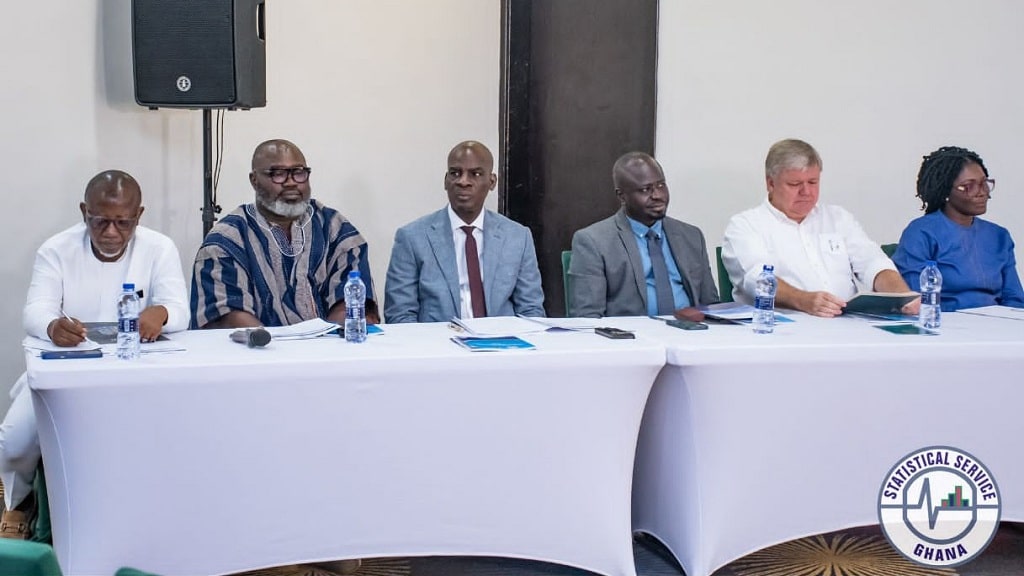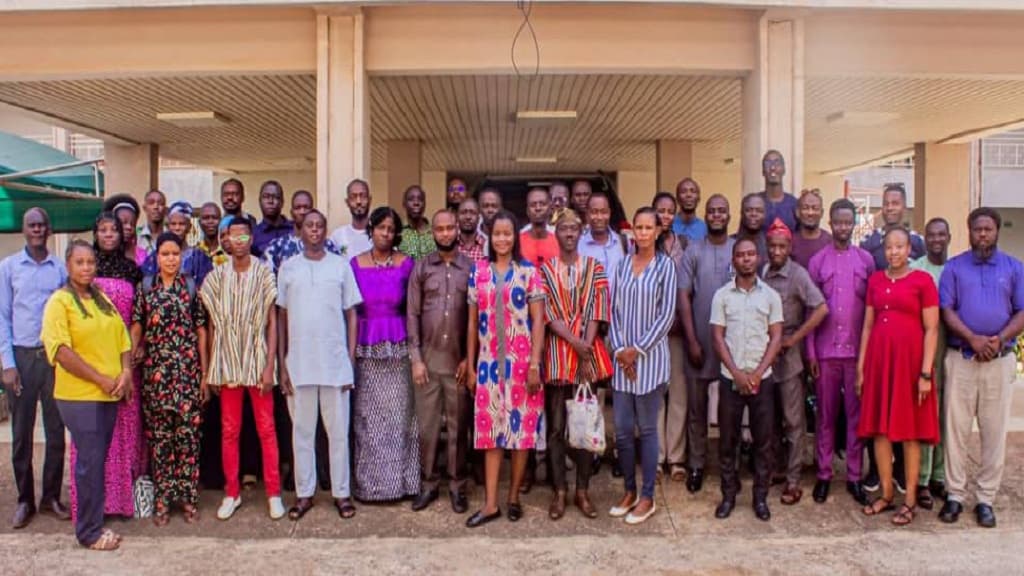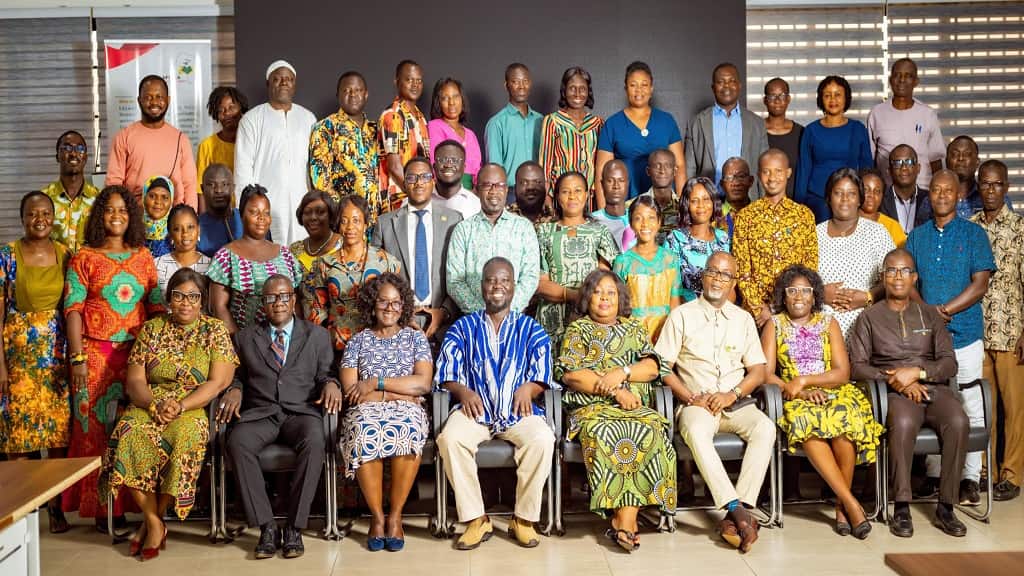Eduwatch Highlights Ghana's Rural-Urban Divide In Basic Education At Post-Budget Workshop For MPs
|  | |
|
On Sunday March 16, at Ghana's Parliament, Eduwatch’s Executive Director, Kofi Asare, made a presentation to Members of Parliament (MPs) during their Post-Budget Workshop on the growing Rural-Urban divide in basic education access and quality. The Executive Director said the gap is due to the inclusion-blind budgeting system. Excerpts of his presentation are as follows:
1. According to Eduwatch, at the basic level where some 5,300 schools still take place under trees, sheds, and dilapidated structures, with 3,600 JHS and 800,000 desks deficits, coupled with widespread lack of ICT facilities, there exist an infrastructure financing gap of US$3 billion in the medium-term 2025-2030.
2. As USAID withdraws funding for education, over 1,200 deprived schools in northern Ghana need targeted support, including Teaching and Learning Resources and furniture.
3. The potential significant allocation of the un-capped GETFund towards non-infrastructure budget lines such as free SHS and free tertiary education, flies in the face of efficient use of the Fund owing to the huge infrastructure deficits at all levels.
4. Regarding the GHC 145 million Capitation Grant allocation, migrating its financing from the consolidated fund to GETFund, will prevent the conventional delayed releases from affecting its impact.
Mr. Asare appealed to the Minister of Finance to redirect the ABFA funding into rural education infrastructure at the basic level, owing to concerns over the withdrawal of over GHC 2 billion ABFA funding for education. He also urged MPs to ensure inclusive allocation of the education budget to bridge this gap.
© Africa Education Watch | |
|
|
|
Eduwatch Executive Director Chairs GSS Education Report Launch
|  | |
|
On Tuesday March 25, Eduwatch's Executive Director chaired the launch of the Ghana Statistical Service (GSS) report titled ‘Access to and quality of basic and secondary education in Ghana (2000 - 2023)’ at an event in Accra.
The report outlines the trajectory of access and quality over two decades of implementing free basic education in Ghana, and secondary education, while identifying the gains and gaps.
In attendance were the Minister for Education, the Government Statistician and the Danish Ambassador to Ghana.
The full report is available on the GSS website.
© Africa Education Watch
| |
|
|
|
Eduwatch Conducts A Citizens' Participatory Review Of The Implementation Of Policy Targets In Ghana's Education Sector Medium Term Development Plan [(ESMTDP) (2022-2025)]
|  | |
|
Between February 17 and March 7, Eduwatch Enumerators and Partners visited 14 purposively selected districts (Endowed and Deprived) spanning 6 regions, to seek citizens’ perspectives on progress and challenges in quality and access, and inclusivity of Ghana’s basic education system.
In line with Ghana's Education Strategic Plan (ESP), the Education Sector Medium-Term Development Plan [(ESMTDP) (2022-2025)] is a critical component designed to align with Ghana's commitment to the Sustainable Development Goal 4 (SDG 4). It aims to ensure inclusive and equitable quality education and promote lifelong learning opportunities for all.
As Ghana navigates the final year of the ESMTDP (2022-2025), it is crucial to review the performance of various indicators against set targets to inform the development of the next phase of the Plan (ESMTDP 2026-2030).
With support from the Foreign, Commonwealth and Development Office (FCDO) and in partnership with STAR-Ghana Foundation, Eduwatch conducted this citizen-led research to review the implementation of basic education policy targets within the ESMTDP (2022- 2025) to influence the development of the next ESMTDP (2026-2029).
© Africa Education Watch
| |
|
|
|
Eduwatch Holds Stakeholder Validation Workshop In Tamale For A Citizens' Participatory Review Of The Implementation Of Policy Targets In Ghana's Medium Term Development Plan 2022-2025
|  | |
|
On Tuesday March 18, with support from the Foreign, Commonwealth and Development Office (FCDO), and in partnership with STAR-Ghana Foundation, Eduwatch held a Northern Zonal meeting at the UDS Central Administration to validate the key findings of a citizens'-led research to review the implementation of basic education policy targets in Ghana's Education Sector Medium Term Development Plan [(ESMTDP) (2022- 2025)]. The validation meeting was held for the 7 deprived districts of the sampled 14 where data was gathered for the research.
In a presentation on key findings from the research, Eduwatch Programme Officer, Kwasi Nimo Jnr presented the following key findings:
1. Enrollment has been unstable across deprived and endowed districts owing to factors related to infrastructure and teacher among others.
2. Primary-JHS Transition Rates in the deprived areas fall significantly below the Medium Term target. This was attributed to the surge in Primary schools without JHS, resulting in pupils having to commute long distances to access JHS post-Primary 6.
3. Under WASH, in deprived districts, only 22% had clean toilets, with just 18% being separate for boys and girls. In the endowed districts with significantly lesser schools however, 44% had access to adequate clean toilets, with 39% being separate for boys and girls. The lack of adequate toilet facilities hampers school retention, disproportionately affecting girls.
4. Regarding Pupil-Teacher Ratio (PTR), except in JHS, deprived districts missed PTR targets for KG and Primary. At the JHS level, PTR was lower in deprived districts than endowed. While large urban class sizes fuel PTR deficits in endowed districts, the lack of adequate rural teachers drives the deprived districts’ situation.
5. On Textbooks availability, endowed districts had more textbooks than deprived per the total quantity of books required for the four (4) core subjects for which data was collected.
6. On desks availability, deprived schools, despite serving a large student population (102,106), have only 71,932 desks, indicating a shortfall that could impact learning conditions.
In a discussion on the research findings, a panel, comprising the Head of Planning at the Northern Regional Education Office, Sule Mahamoud Shaibu, the Dean of the Department of Environment and Sustainability Sciences at the University, Prof. Ebenezer Owusu-Sekyere and the MEAL Specialist at School for Life, Bukari Yahaya Abubakari, confirmed the findings presented, indicating that they aptly captured the issues.
Panelists stressed the need for particular attention to WASH issues within the school environment. Beyond providing adequate clean toilets for girls and boys, the panel stressed the need to address issues of adequate water supply to schools to aid in maintaining hygiene among pupils. Although the government's promise to provide free sanitary pads was critiqued for sustainability, it was lauded for its potential to respond to the menstrual needs of girls in public basic schools, especially in deprived areas.
To address the infrastructure and textbooks deficits, panelists recommended local philanthropy and communal (SMC/PTA) involvement in providing infrastructure for schools, to complement government's support.
Participants from the District Education Offices and schools lauded Eduwatch for the research, and validated same, as a true reflection of issues within the school environment per data provided. Civil Society Partners, as well as the University community were also represented to share their insights and recommendations for improving access, quality and inclusivity in Ghana's basic education system.
© Africa Education Watch
| |
|
|
|
Eduwatch Holds Stakeholder Validation Workshop In Accra For A Citizens' Participatory Review Of The Implementation Of Policy Targets In Ghana's Medium Term Development Plan 2022-2025
|  | |
|
On Thursday March 20, with support from the Foreign, Commonwealth and Development Office (FCDO), and in partnership with STAR-Ghana Foundation, Eduwatch held its final Zonal meeting in the southern zone to validate the key findings of a citizens'-led research to review the implementation of basic education policy targets in Ghana's Education Sector Medium Term Development Plan [(ESMTDP) (2022- 2025)]. The Southern Zonal Convening, held at the WACCI Auditorium on the University of Ghana campus, involved the 7 endowed municipalities out of the total sampled 14 where data was gathered for the research.
In a presentation on key findings from the research, Eduwatch Programme Management Specialist, Kofi Nkansah Sarkodie presented the following:
1. On Pupil-Teacher Ratio (PTR), endowed districts attained the Medium Term ratio (31), but missed the PTR targets for Primary (40) and JHS (22). The large urban class sizes were found to fuel these deficits.
2. The Pupils to Desks ratio was 2.3:1 for endowed districts, who had the highest number of seating places (108,220) for students (124,184), indicating a deficit of 15,964. In Teshie Salem JHS, 3 students share a dual desk meant for 2.
3. Of the 769 schools in the sampled endowed districts, only 401 (52%) teach Computing. Also, just 60 (8%) of these schools have computer labs.
4. On Water, Sanitation and Hygiene (WASH), only 44% of the sampled schools (769) had clean toilets. As well, only 39% had separate toilets for boys and girls.
In a discussion on the research findings, a panel, comprising the Regional Planning Officer at the Greater Accra Education Office, Sam Dzanku, the Greater Accra Regional Manager at ActionAid, She-Vera Anzagira and a former Regional Director of the Ghana Education Service, Dr. Peter Attafuah, indicated that the findings confirm data available to the regional education office and civil society. Among others, panelists called for decentralization of teacher postings to ensure effective posting of teachers based on the need in schools. Panelists also called for a decentralization of desks distribution as part of measures to curbing the increasing desks deficits.
On improving girls' participation in basic education amidst improved WASH conditions, panelists recommended the need to revisit previous basic school desks designs which were gender-sensitive, and responded to key issues including girls postures.
Participants from the Municipal Education Offices and schools lauded Eduwatch for the research, and validated same, as a true reflection of issues within the communities and schools.
© Africa Education Watch
| |
|
|
|
Eduwatch Hosts National Dissemination Of Key Findings From Its Review Of Ghana's Medium-Term Development Plan (2022-2025)
|  | |
|
On Thursday March 27, with support from the Foreign, Commonwealth and Development Office (FCDO), and in partnership with STAR-Ghana Foundation, Eduwatch held a National Convening to disseminate key findings from its citizens'-led research to review the implementation of basic education policy targets in Ghana's Education Sector Medium Term Development Plan [(ESMTDP) (2022- 2025)]. The convening was held at the WACCI Auditorium on the University of Ghana campus.
Policy Stakeholders were represented from the Ministry of Education (MoE) and the National Development Planning Commission (NDPC - the institution leading the development of the next Education Sector Medium Term Plan). The Greater Accra and Northern Regional Directors of Education, Municipal Education Directors from the Greater Accra and Ashanti regions, and Heads of Civil Society Organizations in the social development space, were also present.
Following a two-part presentation on the key findings from Eduwatch's Executive Director, Kofi Asare, representatives from the MoE and NDPC committed to engage Eduwatch, Civil Society and other key stakeholders on the findings of the Research, to ensure mechanisms and approaches to addressing the challenges presented, find expression in the next Medium-Term Plan and Policy Strategies.
Participants in their submissions lauded the extensive research/assessment conducted by the Eduwatch Team, and made various recommendations aimed at improving Net and Gross Enrolment, Gender Parity, Pupil-Teacher Ratio, WASH, and access to essential Teaching and Learning Resources and other indicators from the research, to enhance access and the quality of Ghana's public basic education system.
This participatory review, which assesses citizens' perspectives on progress and challenges in quality, inclusivity and access, aims to influence strategies and interventions in the development of the next ESMTDP (2026-2030).
Eduwatch is grateful for the support and partnership of FCDO and STAR-Ghana Foundation, and to all National, Regional, Municipal and District officials of the Ghana Education Service, whose invaluable contributions led to the success of the research activity. The full Research Report shall be published in April 2025.
© Africa Education Watch
| |
|
|
|
|